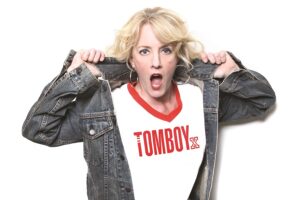Eight years had gone by since she graduated from college, and Suzanne Westenhoefer realized that, despite all the intention-setting, she had done almost nothing to get work as an actor.

It was 1990 and Westenhoefer was living in New Jersey, on the more affordable side of the George Washington Bridge. The idea was that she would cross the bridge whenever there was an open audition. The reality was that she worked the 10 a.m.-to-7 p.m. bartending shift at Houlihan’s, and afterward there just wasn’t the time or energy.
A regular at the bar — “we called them ‘regulars’ back then,” she says, “but we’d call them alcoholics nowadays” — told her how funny she was, that her stories always made him laugh, and that she should do stand-up comedy.
There was a hitch, though: Westenhoefer was an out lesbian. At the time, there were only a few out comedians, and they performed only in gay clubs for gay audiences, never at the bigger open mics. “I wanted to perform in a regular club,” Westenhoefer says. “But what was I going to do, get up on the stage and talk about a boyfriend I didn’t have?”
She went anyway. Throwing caution to the wind, she got up on stage at Kelly’s, a cabaret in the West Village, and winged it — in an extemporaneous, elliptical style she’s been perfecting for the last 33 years. “When I’m doing a show, I know where I’m going to finish because I want to end on a big laugh, but, up until that point, it could be anything,” she says. “I tell stories, and they’re funny. But I don’t sit down and write jokes.”
One of those stories: In 2006, Westenhoefer was up in arms that the Chicago Gay Games wasn’t allowed to call itself “the Gay Olympics.”
“Little activist Suzanne came out saying, ‘That’s bullshit. That’s a hate crime,’ ” she says. “Then, I went to the gay games. And one of the events was darts.”
Her stories made Westenhoefer a favorite at comedy shows. At that first open mic — on July 31, 1990 — she won and took home $25. Within a year, she was headlining her own show. She quit her bartending job and moved to Los Angeles. She was a lesbian but also a blonde, and she found that those two things worked together in an industry that wanted edge while still maintaining mass appeal.
“Talk shows started coming for me,” Westenhoefer says, “They were saying, ‘She doesn’t look like a lesbian, but she’ll say she’s a lesbian.’ ”
Less than four years into her comedy career, she booked a half-hour special on HBO, making her the first out lesbian to perform stand-up on television. In that special, Westenhoefer comes out dancing in a vest and button-down shirt. She tells a story about how “this little worm of a manager” at a comedy club in New York told her she was funny but she couldn’t perform for him because he was in the business of turning out television stars and she, a lesbian, would never be on television. “No lesbians on television,” she says. “What about Wimbledon?”
Then Ellen came out. On the cover of Time magazine, no less. Westenhoefer quickly realized that the entertainment industry wanted a lesbian, not lesbians. The talk shows that had been banging down her door went silent. As she went to auditions in Hollywood, it became apparent that the identity that had made her unique had also pigeonholed her.
“I couldn’t get roles for a Coke commercial or to be the neighbor with a line or two in a television show because I had been all around Hollywood performing on stages as a lesbian,” she says. “They wanted regular people for those roles, not me. I lost a lot by being openly gay. But I wanted it to be better for the generation below me.”
And it is better. Today, several of the cast members on Saturday Night Live are gay — and they get to perform in skits that deal with their identity and in ones that have nothing to do with queerness. John Early has an hour-long HBO special in which he talks at length, and with no shortage of hyperbole, about anal sex. “Now you can’t go to a city or town that doesn’t have a gay comedy night,” Westenhoefer says. “There’s just so much of it.”
Whereas people once wanted only one gay person, now, Westenhoefer says, it seems they can’t get enough of us. This, she notes, presents its own problems. Just look at Provincetown.
“It used to just be gay people who wanted to come here to be gay,” she says. “Now it’s straight couples and families who want to come to see gay.”
All of this makes Women’s Week, during which Westenhoefer will be performing eight stand-up shows at the Red Room, more needed than ever. It’s a time when, now that all the other tourists have gone back to the mainland, lesbians can feel like the majority.
“I don’t get to experience being the majority anywhere or anytime else,” she says. “I’ve been coming to Provincetown since 1991, and every time I’m back I still can’t believe it. I just love it, you know, when the chicks are everywhere.”
Lesbian Laughs
The event: Stand-up comedy with Suzanne Westenhoefer
The time: Oct. 7-14 at 7 p.m., Oct. 15 at 4 p.m.
The place: Red Room, 258 Commercial St., Provincetown
The cost: $25; see redroom.club
